Morse Brothers “cranberry” company claims mining is for agriculture, public campaign exposes zoning, water violations
-
February 5, 2024: Court denies Morse request for an injunction to stop Halifax from requiring an earth removal permit
-
Read the Jan. 26, 2024 Plympton Halifax Express news story, Sand Wars in Halifax Continue here
-
December, 2023: Town refuses to enforce zoning law to prohibit mining in water protection district
Background
The public is exposing another commercial mining operator claiming to be “cranberry agriculture” in order to exploit loopholes and evade regulation: this one being done under the name of Morse Brothers Cranberry and is located on Monponsett Pond at 250 Lingan Street.
History and Exploiting Legal Loopholes
For decades, Morse Brothers Cranberry has been mining on Monponsett Pond in Halifax in a drinking water zone. Morse appears to be a shell corporation covering for a shady network of sand and gravel mining interests in the region.
Oiva Hannula Cranberry Co. of Carver, MA is one of the companies with a “management contract” with Morse for the Halifax mining operation. Scott Hannula is on the town committee in Carver that issues permits for mining operations. Scott Hannula appears to both own or operate his own cranberry company and the Oiva Cranberry Co. He is also on the board of the Cape Cod Cranberry Growers Association. This demonstrates the close network of companies and industry players involved in sand mining in the region. See: Morse Cranberry Co.- Moquin Affidavit, 2023 and contract with Hannula
Morse’s “portfolio of approximately 300 total acres of cranberry growing” includes bogs in Halifax, Middleboro and Hanson. By claiming it is trucking sand from town to town for these cranberry operations, Morse asserts it is exempt from regulation as “agriculture.” Where is the sand really going? Who’s accounting for it?
In Halifax, Morse’s mining has been leveling a unique geological formation known as the Whaleback Ridge, a forested glacial esker. Morse has been removing it for commercial sale, one excavator buck load at a time, for over a decade. The Whaleback is a known Native American Indigenous archeological site.
Morse has mined at least 165,000 cubic yards of sand and gravel from the Halifax site although an accurate count has never been done.
There is more sand and gravel in the Whaleback Esker and around it. In 2016 the Town gave Morse a permit for 50,000 cubic yards. In April, 2022 Morse applied for another permit to expand by 1.14 million cubic yards. Facing fierce public opposition Morse withdrew the permit application in August 2022. Morse and Ryco Excavating kept mining. In December 2022 the Selectboard issued a cease and desist and Morse and Ryco still kept operating according to witnesses.
In November, 2023, the Selectboard gave Morse a permit for 20,000 cubic yards, phase 1 of the previously proposed 1.1 million cubic yard operation. Morse then went to court saying it doesn’t need a permit because it is agriculture. On Feb. 5, 2023, the Superior Court denied Morse’s injunction to set aside the permit. Read more below.
Sand Wars
Morse’s Halifax site is one of the approximately 110 sand and gravel mining sites in Southeastern Massachusetts exposed in Sand Wars in Cranberry Country, An investigation into the money, politics and corruption behind sand mining and its silent environmental crisis in Southeastern Massachusetts. A report, interactive website and short film explain why and how sand mining is happening in the region.
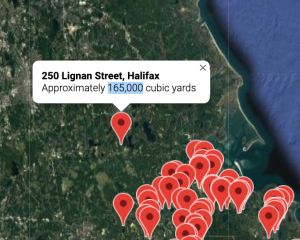
December 2023: Town refuses to enforce zoning bylaw prohibiting mining in drinking water protection district
In late November, 2023 Halifax residents sent a demand for enforcement of the zoning law to the zoning officer of Halifax asking them to rule that the Board of Selectmen Nov. 16, 2023 permit to Morse Brothers, Inc. was illegal. In 2022, the former zoning officer said it was illegal. Yet in 2023, the new zoning officer said the mining was OK under the zoning laws. Why?
Here is the resident’s 2023 demand that the zoning officer denied:
Halifax Zoning Enforcement Demand Nov 2023
Here is the 2022 zoning officer decision saying the mining is illegal. How can the zoning officer in 2023 say the opposite?
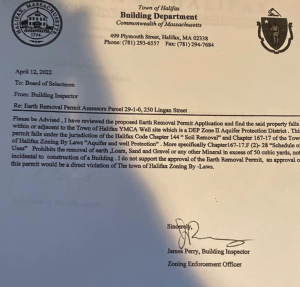
Nov.-December, 2023: Town grants permit, Morse sues and loses injunction request
On November 6, 2023 the Halifax Board of Selectmen held a public hearing on Morse Brothers’ new application “earth removal” permit to mine an additional 20,000 cubic yards of sand and gravel from 250 Lingan Street. In 2023, the company sought a permit for about 1.1 million cubic yards (see below). It withdrew the permit application in the face of fierce public opposition.
There can be no dispute that the November, 2023 permit is just Phase 1 of Morse’s plan to excavate the entire 1.1 million cubic yards. This will level the Whaleback Esker.
The November 6, 2023 hearing room was filled to near-capacity, with attendees spilling out into the hallway. About two dozen Halifax residents spoke against the permit. Not one member of the public spoke for the permit. The public’s concerns stated at the hearing included:
- Threats to public safety from truck traffic on local, unpaved roads
- No benefit to Halifax but a detriment resulting in deforestation, taking earth from Halifax and moving it to another town, and adding 750 truck trips to their already deteriorating and degraded roads
- The impact of tractor trailer trucks on underground water and gas lines that lie only about 18″ below the road used as the trucking route. This includes concerns about a possible gas explosion or water main break from the pressure of the loaded trucks .
- Safety of their children, many of whom walk or ride their bikes on the road used as the trucking route
- The mining is prohibited in the water protection district where it is located: the town’s zoning law clearly prohibits mining in well protection zones. See: Zone IIs and Public Water Supply Wells
Other evidence presented at the hearing:
Residents’ evidence shows Morse’s mining has excavated into the groundwater which is forbidden by law. One resident asked for an environmental study on the region before any more earth removal permits are issued. One resident stated one of the public supply wells in Halifax had tested at 15 ppt for PFAS, just below the EPA limit of 20 ppt. He asked the Board to consider what would happen if the wells tested above the EPA limit for PFAS as a result of all of the earth removal in town. Would they have to buy treated water back from Brockton? Residents noted that because of the site’s location within the Zone II of their public water supply wells, this project impacts all of Halifax, not just the abutters.
The public challenged the Board’s authority to issue this permit. They asked the Board if the Planning Board had issued a special permit first, as required. The Board of Selectmen had no answer. The mining may require a special permit because it does not meet the definition of agriculture under their bylaws. If this earth removal was for agricultural purposes the sand would be used on site. However, most of the 20,000 cubic yards of earth will be removed from the site and likely out of town. Therefore it does not meet the definition of agriculture. This project instead fell under the definition of bog improvement – which is construction, under their bylaw, and not qualified for an earth removal permit. When asked where the earth was going to after it was removed from the site, again, the Board of Selectmen could not answer.
On Nov. 16, 2023 the Board of Selectmen issued the permit anyway
Morse sued the Town of Halifax saying the Nov. 2023 permit conditions are illegal and interfere with their “agriculture.” They asked the court for an injunction, which was denied on 2/5/2024. See the court decision here.
Superior Ct Denial Morse Motion for Injunction Judge Glenny-2-5-24
May, 2023: fifteen residents file lawsuit to stop sand mining
On May 5, 2023, fifteen Halifax residents filed a civil complaint against Morse, Oiva Hannula Cranberry of Carver, and Ryco Excavating, Inc. and its related entity, Ryco Leasing and Repair, Inc. for “engaging in unpermitted earth removal on the property located at 250 Lignan Street, Halifax.”
The complaint is here. The residents asked the court to issue a preliminary injunction to stop the operation until the case goes trial and got resolved. Stopping the operation is necessary to prevent irreparable harm to the environment and residents. The injunction request is here. On June 21, 2023, Superior Court Judge Glenny denied the residents’ motion for an injunction siding with Morse, Hannula and Ryco. The Decision is here. The case was eventually dismissed.
Morse Brothers opposed the injunction and submitted the affidavit of the company’s controller, Brendan Moquin. It is very revealing: it says if Morse is prevented from sand and gravel mining it would be “catastrophic” to Morse’s business. The company makes elaborate claims about all the earth materials needed to maintain its bogs, but the numbers tell another story. Read more about Morse Brothers Cranberry profits from sand and gravel versus cranberries below.
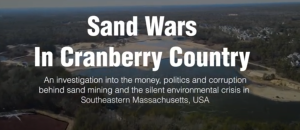
January 10, 2023 Halifax Selectboard meeting on Morse’s sand mining violations
On January 10, 2023, the Halifax Selectboard held a meeting to hear residents concerns and address violations of a December 2022 cease and desist. The public, including members of the Halifax Community for Conservation Efforts, presented clear evidence of the violations/ They described the threat to public safety from Ryco’s truck traffic, drinking water, nearby conservation lands, wetlands, and “outstanding water resources.”
- A mother spoke about her fear of the safety of their children from constant sand and gravel trucks traveling through the residential street.
- Other residents spoke about damage to the Town’s street infrastructure from trucks: culverts in danger of breaking and dangerous road conditions. Residents reported Morse had unlawfully cut the tree buffer along the shore of Monponsett pond.
- Residents explained Morse Brothers has dredged into the aquifer, exposing drinking water to contamination. The mining is within a Zone II Wellhead Protection Area, within Public Supply Watershed, within a Zone A and Zone C Surface Water Protection Area, within an Outstanding Water Resource Area, adjacent to Freshwater Wetlands. It is also adjacent to the Stump Brook Mass Audubon conservation land. Before Morse clear cut and strip mined the 15 acre site it was categorized as Prime Forestland.
At the meeting, Morse Brothers claimed that all the sand gravel removed was going to other bogs they own in Middleborough and Hanson. Residents reported Morse is filling their bogs in Hanson, Middleborough, and at 537 Thompson Street in Halifax with sand 3-4 ft deep. They asked, Why are they filling the bogs with so much sand? Moving earth out of the town without a valid permit, which Morse did not have, is illegal. While Morse attempted to claim an agricultural exemption from the permit requirement, this was not legitimate. Other bogs on the nearby sites are failing due to the high water table.
According to Halifax resident Jeremy Gillespie, “The issue really is, why are they taking the sand out of our water supply protection zones? When they received taxpayer funded grant money from the state for the Middleborough bog project, did they let the state know they’d be taking the sand from these water supply protection zones in another town, whose water supply has been noted as highly susceptible to contamination and abutting the shores of an impaired public water supply lake with an EPA enforceable TMDL?” Read more below about Morse’s taxpayer grants.
Below: Local residents and others, many of whom live along the truck route used by the mining operation, brought the illegal operation to the attention of the Halifax Board of Selectmen, who issued the December 29, 2022 cease and desist.
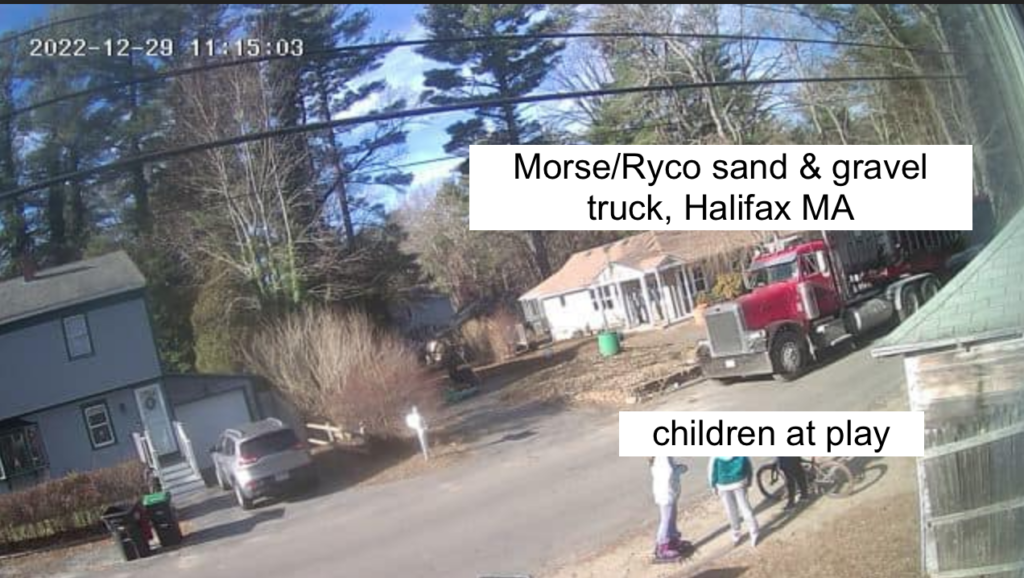
December 29, 2022: Halifax issues cease and desist to Morse and Ryco
Even though Morse withdrew the mining permit application in 2022 (see above) Morse and Ryco Excavating and trucking kept mining at the site.
In December 29, 2022 when the Town Selectboard issued a Cease & Desist Order to Morse Brothers to stop the mining operation after public complaints. The Cease and Desist is below. Morse, Ryco and Hannula kept conducting earth removal anyway and violated the Cease and Desist according to residents and witnesses.
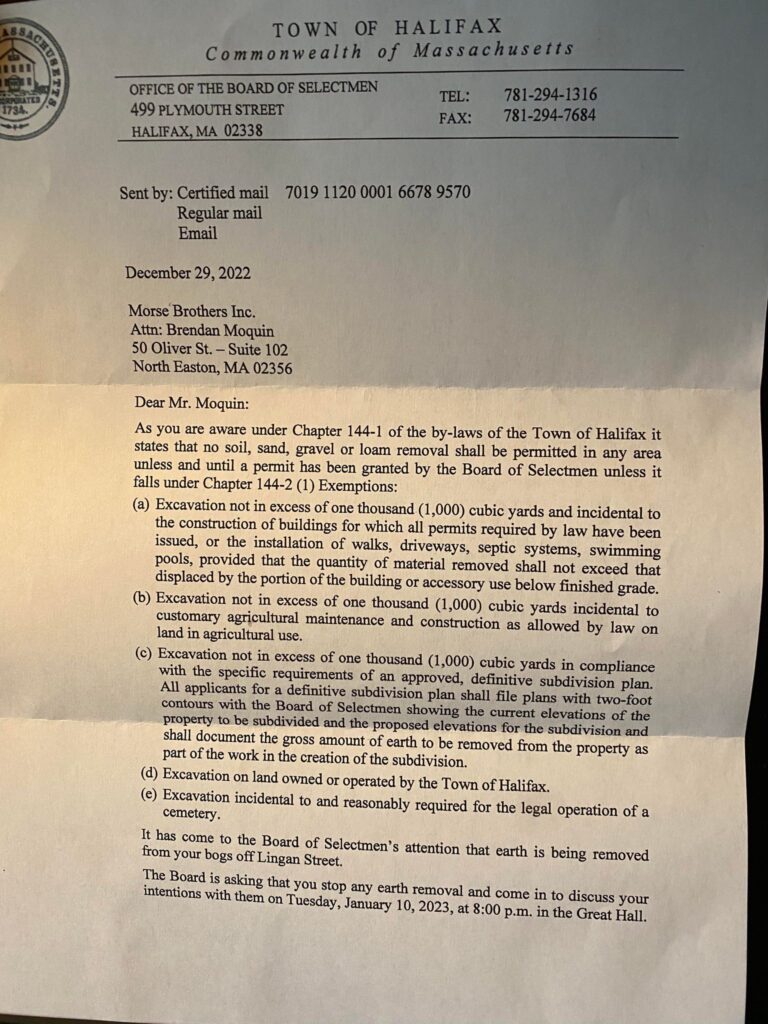
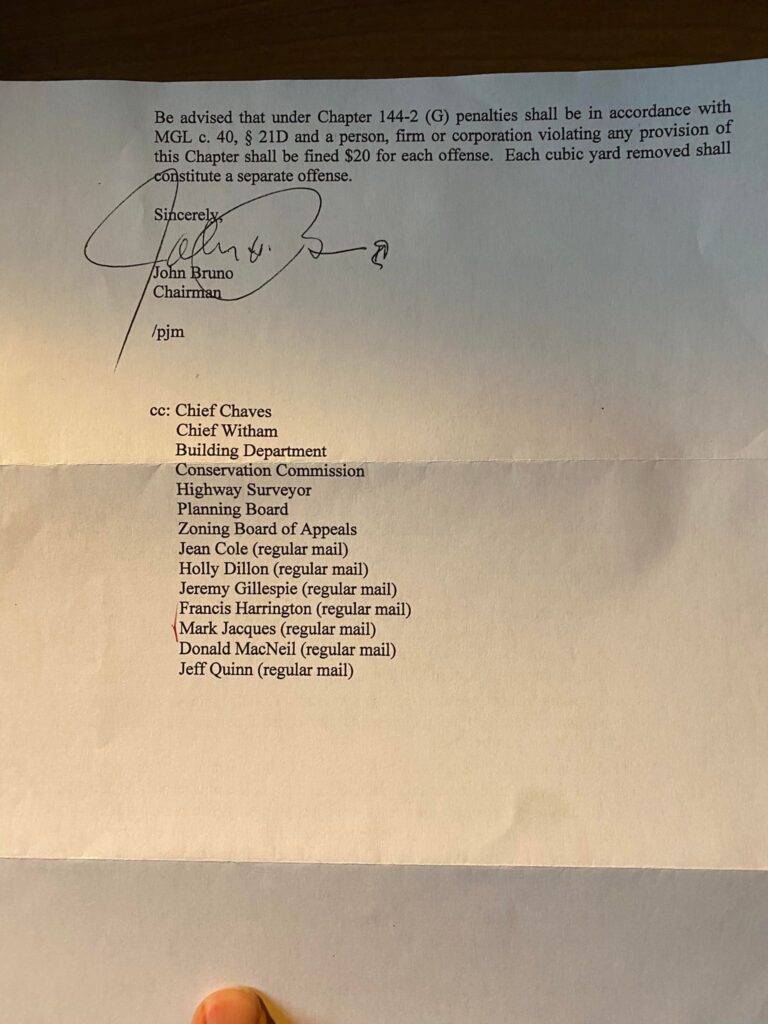
August 2022: Morse withdraws application to remove 1 million cubic yards
In early 2022, Morse filed a permit application with the Town to remove more sand and gravel – 1.1 million cubic yards over 4-5 years from the Lignan Street area. Morse withdrew the application on August 12, 2022 when faced with public opposition. Morse claimed the huge operation was “incidental” to its cranberry operations.
August, 2022: Two of three Halifax Selectboard members resign over mining controversy
In August, 2022, the controversy and backlash from residents about the illegal mining operation and expansion proposal resulted in the abrupt resignation of two of the Town’s three Selectboard members. The Chair was working for the company doing the excavation and trucking, Ryco Excavating. This was clearly a conflict of interest. The abrupt resignations were the subject of a Boston Globe article that however missed the point about the sand controversy.
June 2022: Public hearing on Morse’s application for 1,140,000 million cubic yards of sand and graval
Read the story from Plympton Halifax Express:
JUNE 24, 2022 BY KRISTY ZAMAGNI-TWOMEY, EXPRESS CORRESPONDENT
The Halifax Selectmen met in-person on the evening of June 14. There was a public hearing for earth removal for the Morse Brothers’ cranberry property. Selectman Alex Meade said, “I remember most of the residents’ concerns were about the roadway itself and dust control. Since then, we’ve had questions about runoff from the trucks so leaking hydraulics things like that. I don’t know if you plan on putting in some kind of catch basin filters in?” “Certainly, we would be willing to talk about that,” the Morse Brothers representative said.
Meade said he would like to have a clear-cut definition of what the expectations are for the road condition as well as dust control. The spokesman said that the earth removal was necessary because the current layout is not conducive to newer ways of growing cranberries. “The things that we are talking about make sense for cranberry production. If we change the property to the new way, it now becomes a highest and best use for that property… there are good things for the town, there are good things for the grower… at the end of the day, we just want to coexist,” he continued.
They showed maps of the property to the residents present for the hearing and said that they were also available at Mass Mapper under Zone 2. Residents spoke about their concerns including home depreciation and the safety of children. One resident said that they already deal with being inconvenienced in September and October but said that was just part of the cranberry business. He said, however, that this was different and would cause disruption for years. Another resident said that he worries about the environmental impact of the properties surrounding the one in question including walking trails leading into Burrage. Another resident asked that the official abutters list be expanded to include more properties. Someone else expressed concern about the ability of first responders to get through to homes given the heavy truck traffic which was described as sounding like an “earthquake.”
The Selectmen agreed to do a site visit and then revisit the project in early August. “I don’t think we are at a point in this project to vote either way,” Selectmen Chair Ashley DiSesa said. [DiSesa works for Ryco and subsequently resigned from the Board]

April 2022: Morse applies for an earth removal permit to expand mining operation on Lingan St., Halifax MA
In April 2022, Morse applied to the Halifax Selectboard for a permit to remove 1.14 million cubic yards of sand and gravel to create “cranberry bogs and water supply ponds.” This would entail about 35 truck trips on week days for 5-6 years. It would level the Whaleback esker and mine in the aquifer. The total site disturbance is 67.1 acres.
Town’s report on Morse Brother’s earth removal permit application for 1,140,000 cubic yards on the Whaleback Ridge
Application from Morse Brothers Inc. and Grady Consulting for Earth Removal Permit for 250 Lingan Street
Water, Indigenous site, forests destroyed and more threatened
.
Below: The Whaleback on the shores of Monponsett Pond. The Whaleback’s hills are about 72 feet will peaks that could be as high as 150 feet. Morse’s sand and gravel mining is targeting the highest hills throughout the Site. It has been studied for its archeological significance to the Indigenous people of the region, the Wampanoag. Much of it has already been destroyed. Here is from the President of the Herring Pond Wampanoag Tribe.
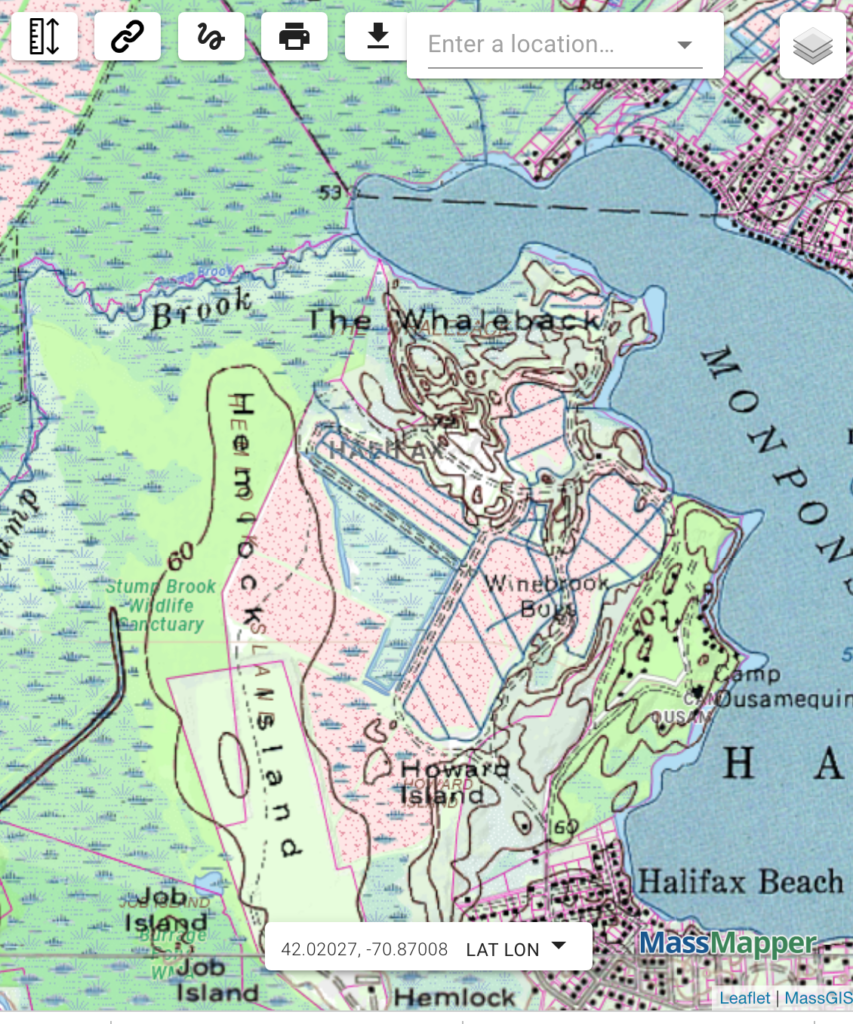
Cranberry profits v. sand and gravel profits
An analysis of cranberry economics and Morse’s Halifax bogs shows that the proposed mining permit application for 1,140,000 cubic yards has nothing to do with cranberries — and everything to do with sand and gravel profits. Cranberries are not profitable. The price per barrel of cranberries has been in sharp decline over the last decade for a few domestic and international reasons. In comparison, the 1,140,000 million cubic yards of sand and gravel Morse wants to mine from Halifax will generate at least $5 million in profits over the life of the project (about 5 years) — or about $1 million per year. (Currently, a cubic yard of sand and gravel generates about $5-$8 in profits)
Morse’s controller testifies in a sworn affidavit that the Halifax bogs produce about 18,200 barrels of cranberries annually, worth about $820, 000 in annual total revenue. Multiple sources put the cost of production of a barrel of cranberries at $30-35 per barrel. For Morse’s Halifax bogs, the cost of production for 18,200 barrels would be about $546,000 to 637,000. This means cranberries from the Halifax bogs generate about $183,000 and $290,000 in annual profits. The controller testifies that Morse has a contract with Ovia Hannula Cranberry for “management contracts” that requires Morse to pay Hannula about $530,000 per year to manage the Halifax bogs, on the low end of a cost of production. Clearly, the profits from sand and gravel of about $1 million per year for 5 years outweighs cranberry profits even in the best scenario at $290,000. per year.
Morse gets $75,000 in “Cranberry Renovation” grants from state, January 2023
Since 2019, the state’s Cranberry Revitalization Program has given out about$1 million in taxpayer subsidies to the cranberry industry. From 2019 to 2022, Morse received $150,000 under this program, including $75,000 for the fiscal year 2023 while illegally mining in Halifax. According to Environmental Working Group, Morse has received federal agricultural subsidies of $640,663 since the 1990s.
Below: Morse/Ryco sand and gravel mining site, Whaleback Ridge area, Halifax MA, January 2023. This is the “cranberry agriculture” receiving taxpayer funded subsidies.
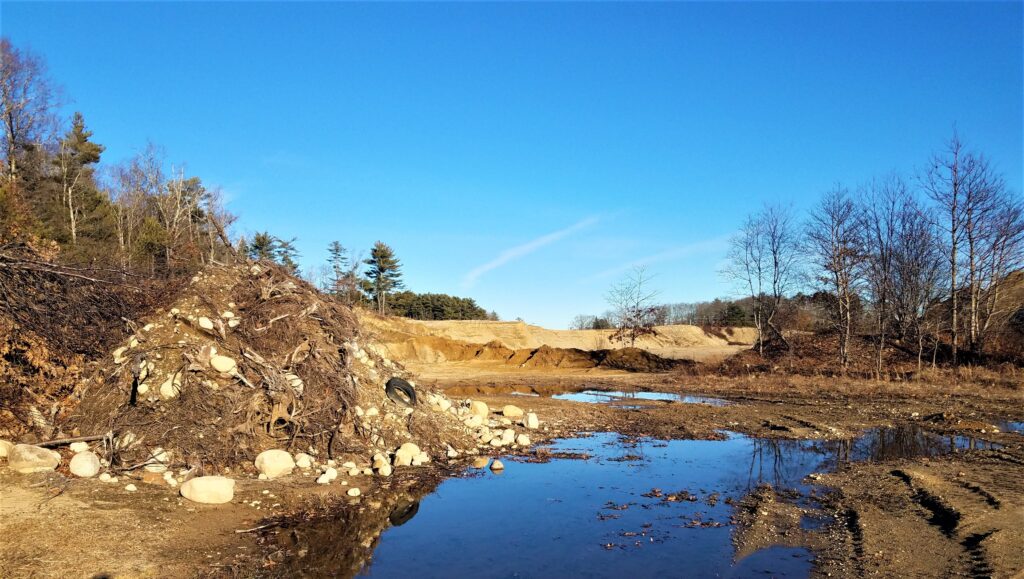
Mining under the ruse of agriculture to exploit legal exemptions for “farming”
Morse and Ryco Excavating claiming their massive sand and gravel mining is allowed as “incidental” to cranberry agriculture like many other mining operations in the area.
Halifax’s general bylaw prohibits earth removal due to its detrimental effects on water supplies, real estate values and the environment. See, General Bylaw, Chapter 144, “Soil Removal.” It prohibits earth removal on land zoned agricultural or residential unless the project qualifies for a permit. It states: “Section 144-1. Permit required. No soil, sand, gravel or loam removal shall be permitted in any area unless and until a permit has been granted by the Board of Selectmen.” There is a limited exemption for certain projects up to 1,000 cubic yards. To remove more, the landowner has to show the operation is “incidental” to an existing agricultural operation on the land. IF the land is being used agriculturally, the landowner can apply for a permit to remove sand and gravel but it has to be “necessary and incidental” to the agricultural use of the land. To get a permit in 2016 for 50,000 cubic yards and when it applied for the 2022 permit for another 1.1 million cubic yards, Morse claimed the sand mining operation is “necessary” to build a bog and “incidental” to the existing use on the land. Neither is true: Morse cannot show it is necessary to build the bog or that the massive amount is “incidental”.
The Town also has a law prohibiting earth removal within 4 feet of the groundwater. Morse wanted to dig into the groundwater to obtain sand and gravel. The people of Halifax passed a law against this type of mining in a residential agricultural zone. Morse has to play by the rules.
This exact scenario is playing out in Carver. On Nov. 2, 2022 a Ten Residents Group argued for a preliminary injunction to stop 150 acres of strip mining by AD Makepeace Cranberry Co. – removing 7.9 million cubic yards of sand and gravel. Enough to fill Gillette Stadium almost 3/4 of a mile high. The Group argues this is not “agricultural excavation ” under the Supreme Judicial Court case. The Court sided with the cranberry giant A.D. Makepeace. The case is in litigation.
Location of earth removal: 250 Lignan Street, Parcel 29-10. Rectangular angles show area where Morse claims it is going to build bogs. This is a common ruse to extract sand and gravel: site bogs on high hills, level them and often never build the bogs.
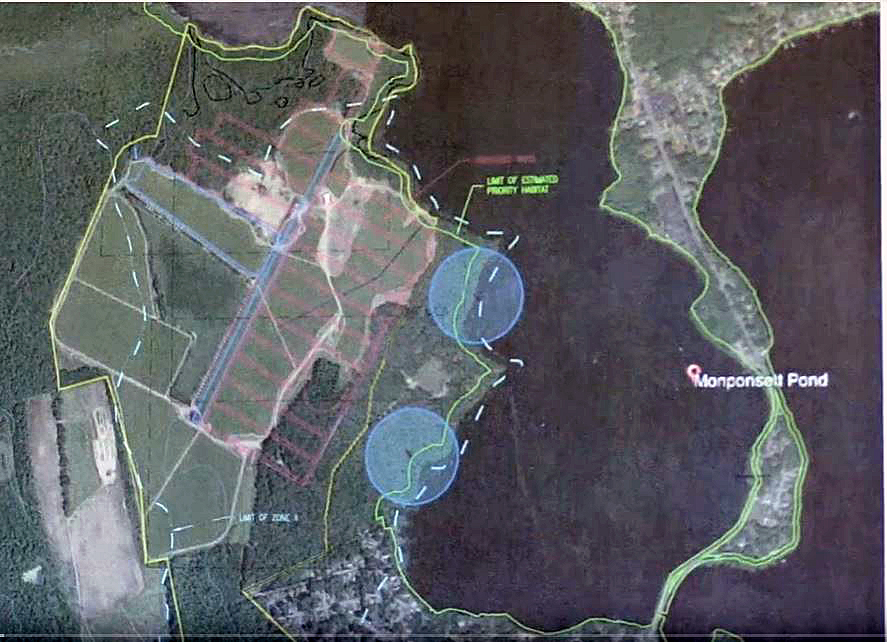
To find out more get in touch with Halifax Community for Conservation Efforts

UPCOMING MEETING WITH THE TOWN AUGUST 9TH AT 6:00 PM
Excellent work!